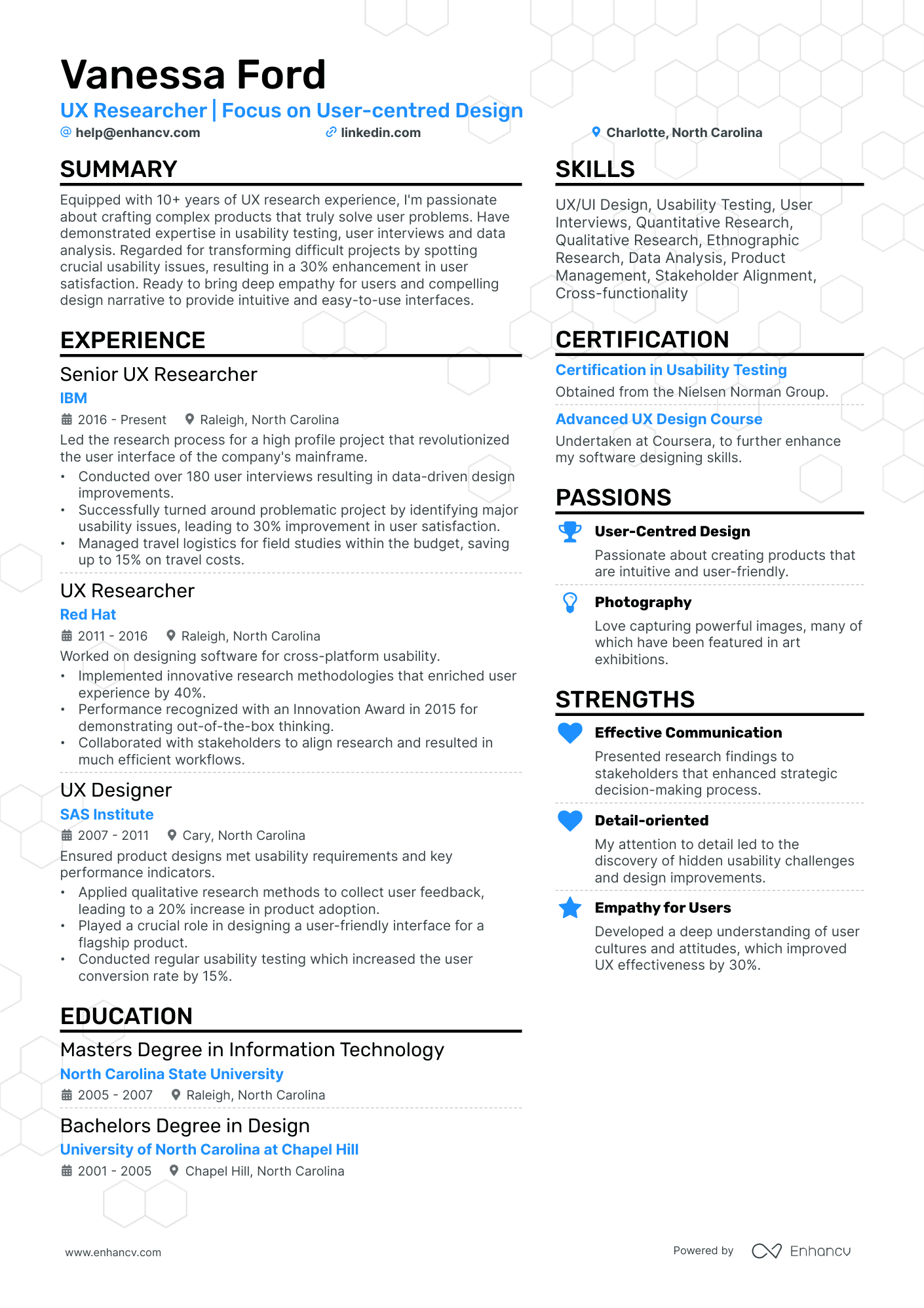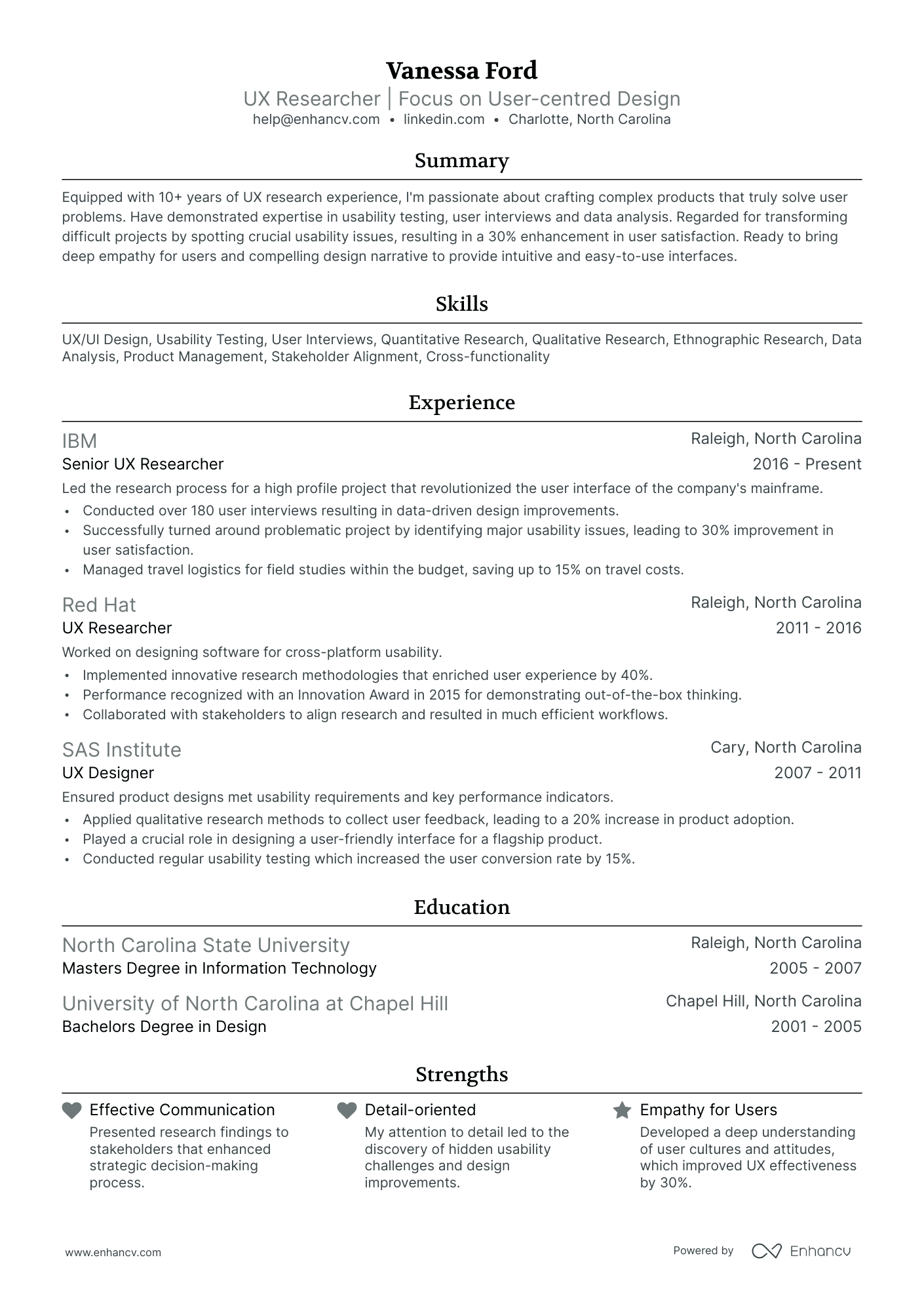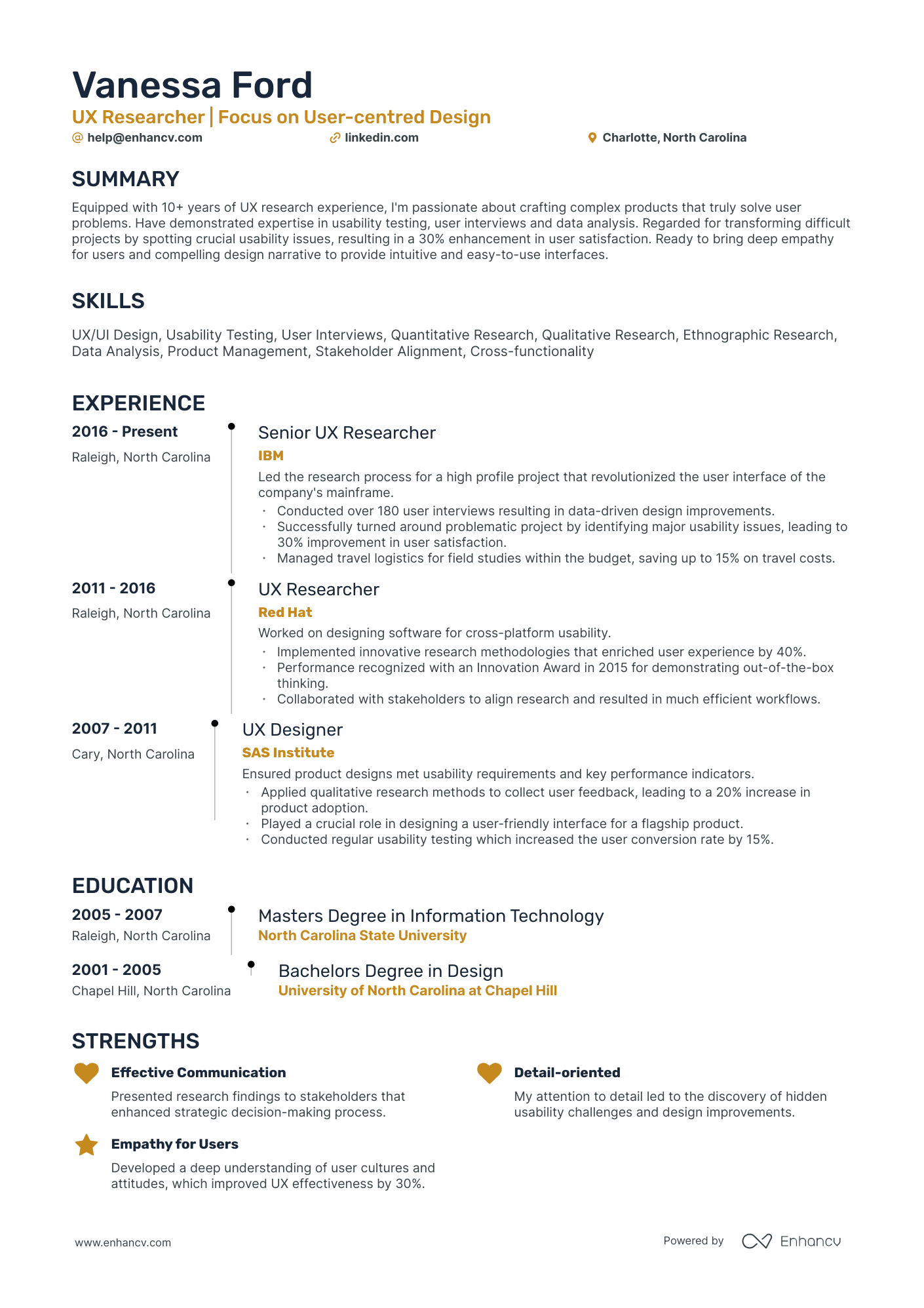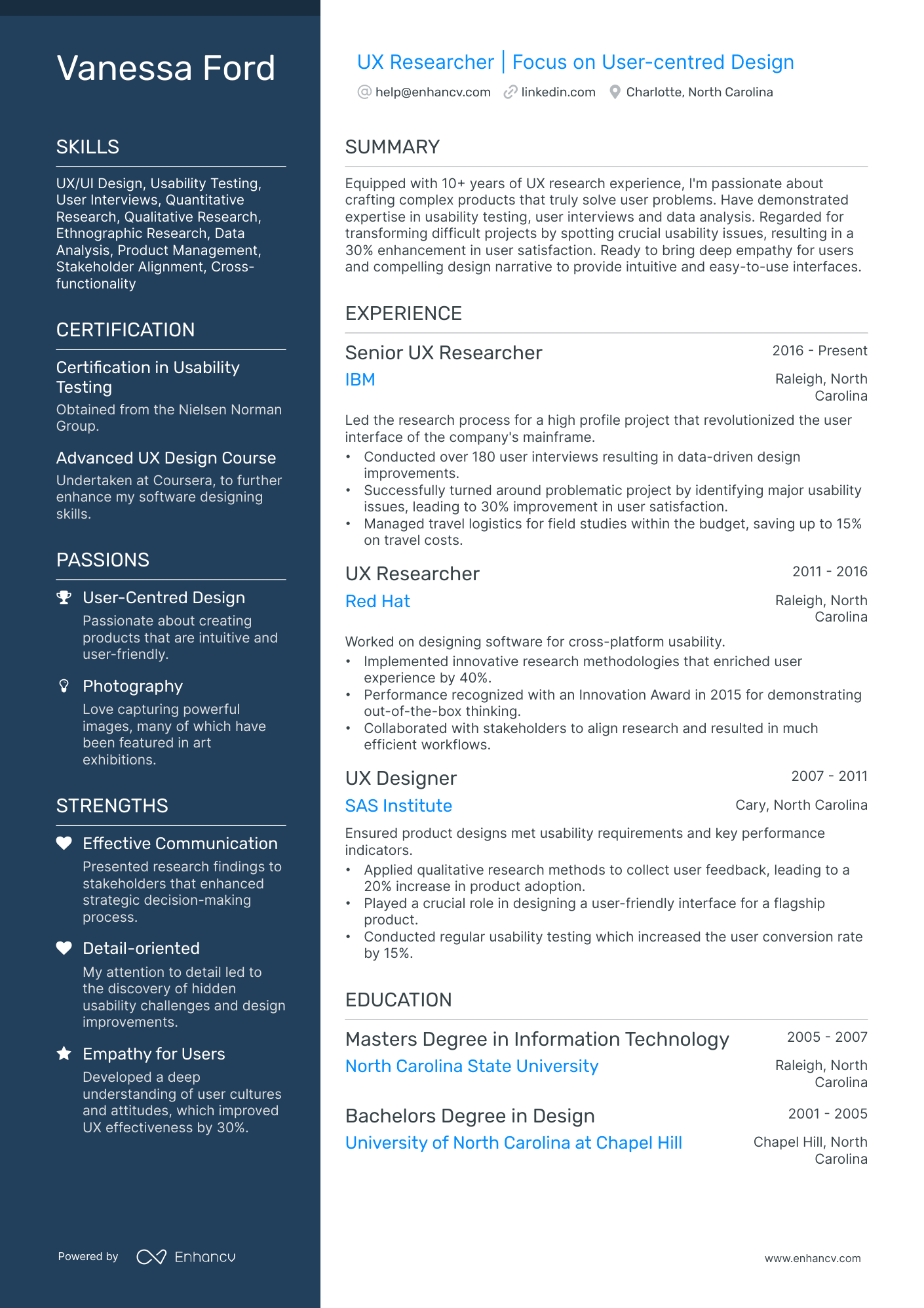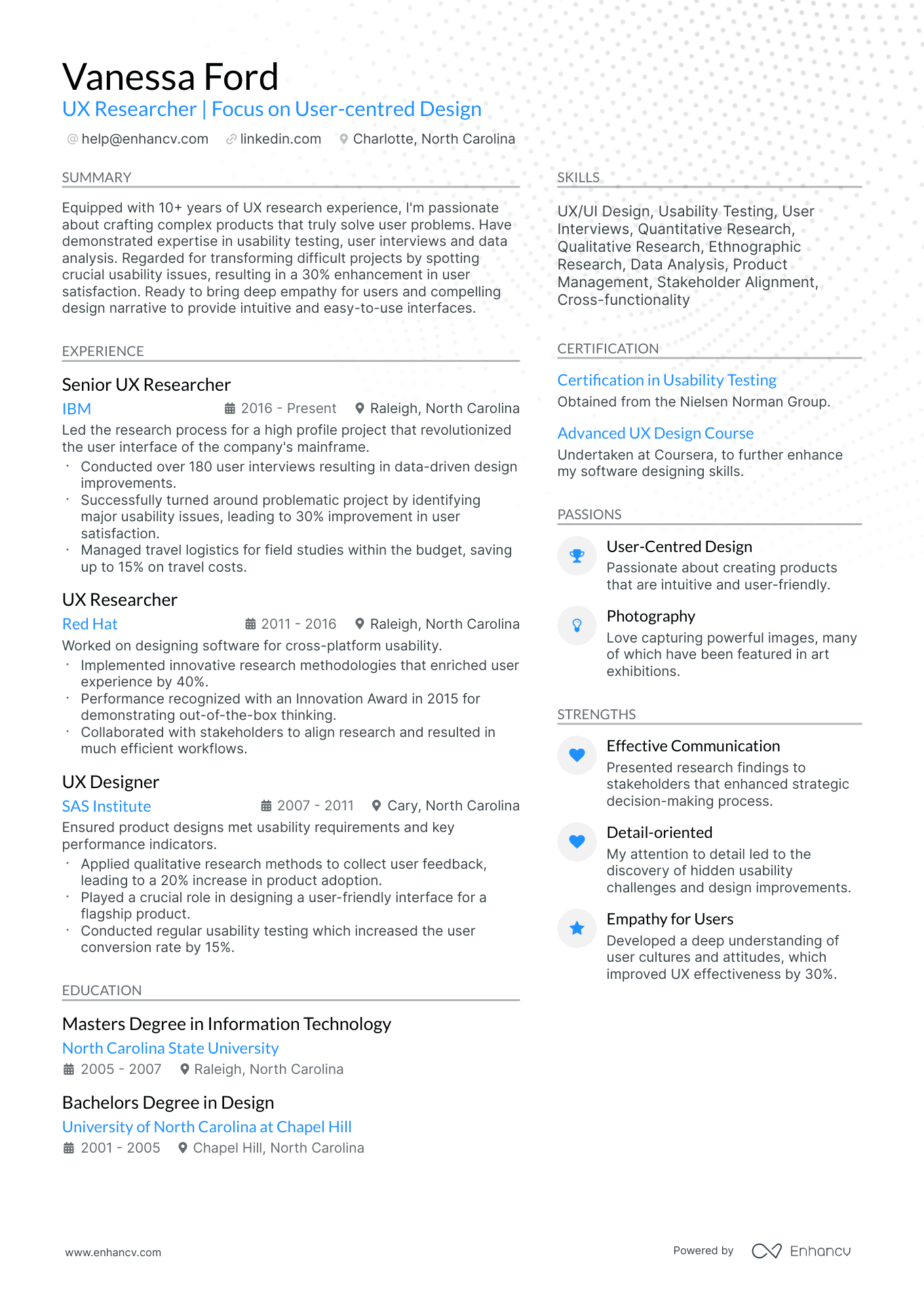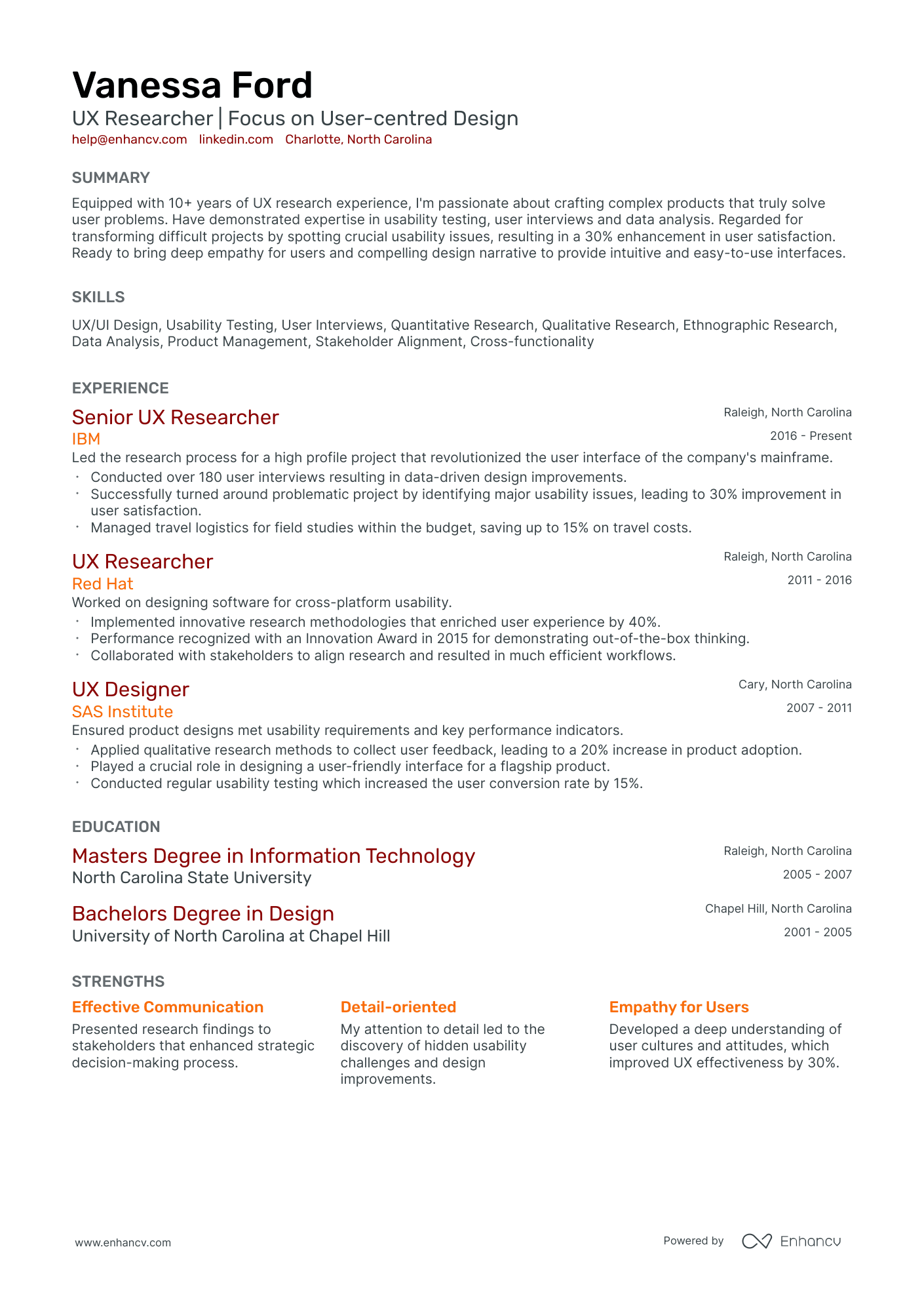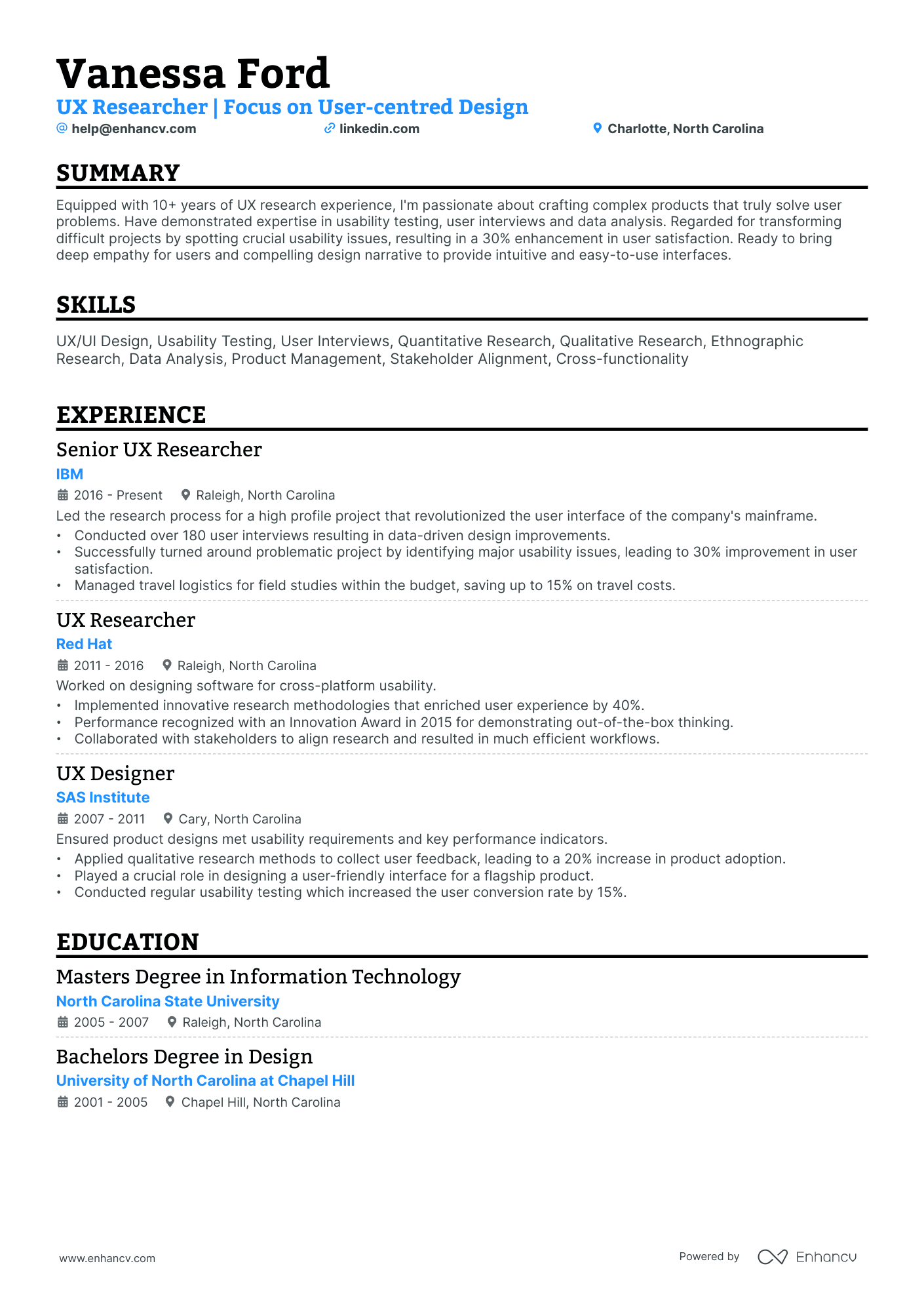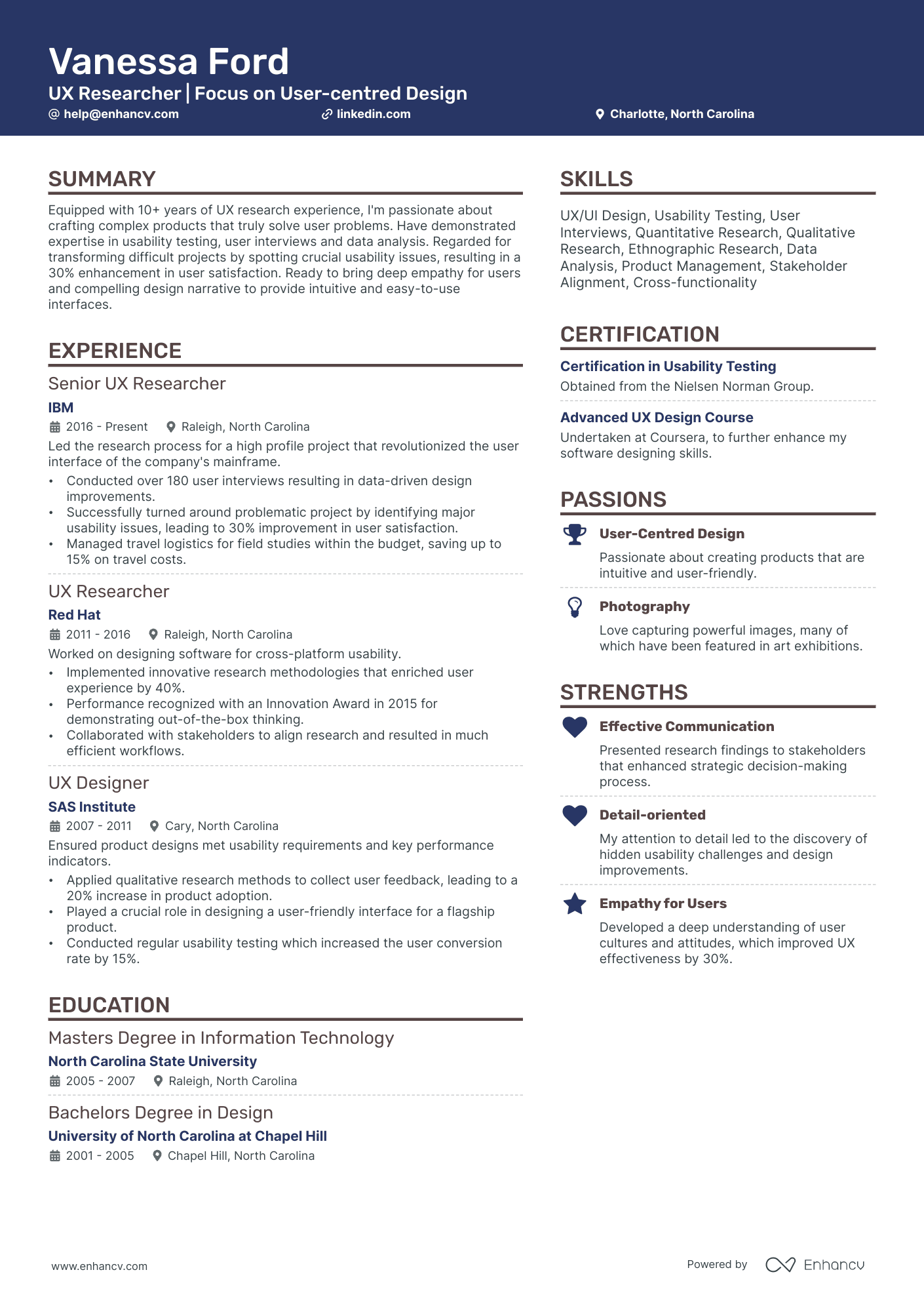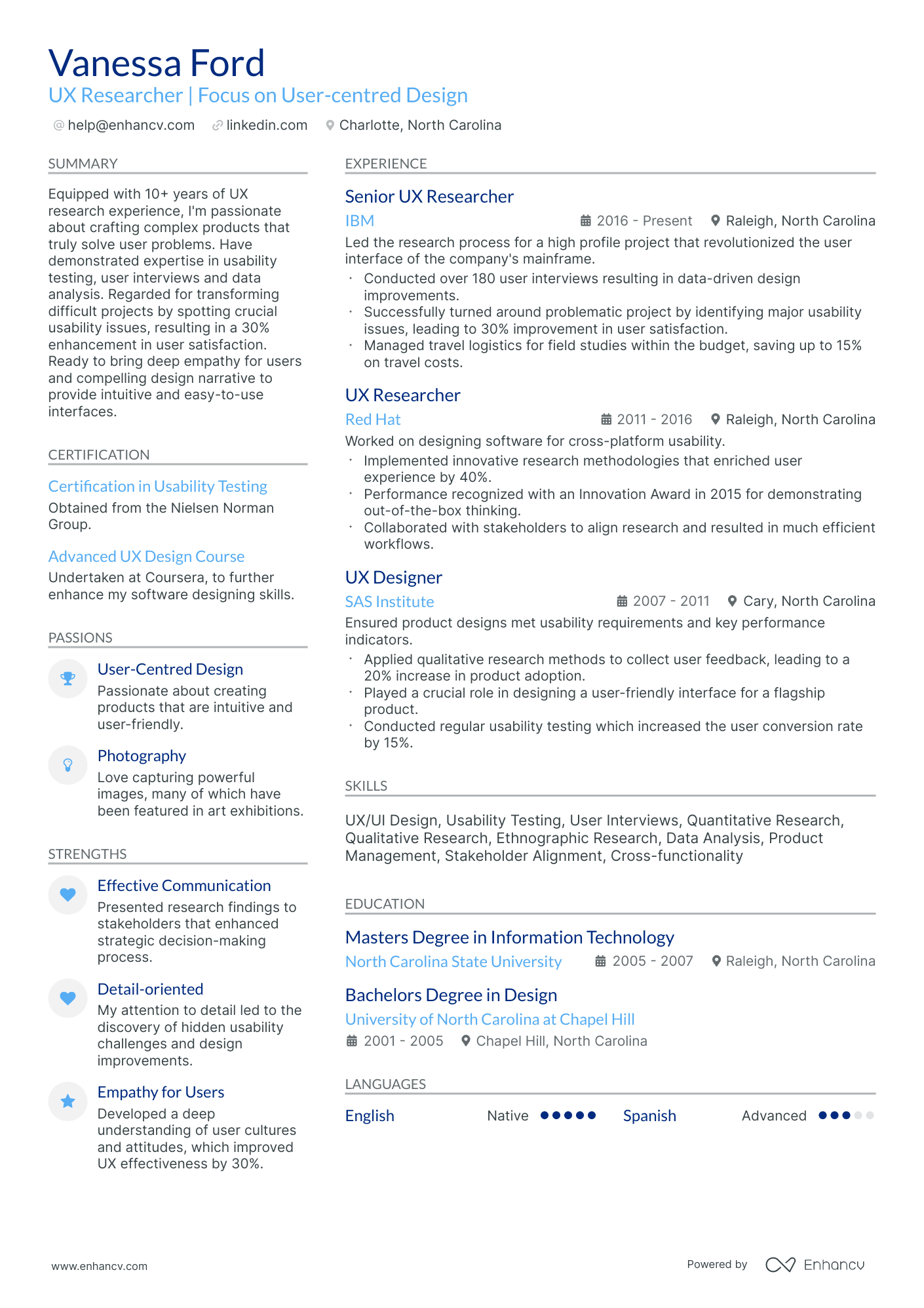One specific resume challenge faced by UX researchers is effectively communicating their technical skills and ability to apply them in diverse contexts, given the wide-ranging nature of UX research projects. Our guide can assist you in addressing this challenge by providing detailed instructions on how to articulate your skills, experiences, and project outcomes succinctly, and by offering sample descriptions from successful UX research resumes to help you craft compelling narratives.
Dive into this guide to uncover:
- Top-tier UX researcher resume samples that have successfully landed candidates in leading companies.
- Strategies to direct recruiters' focus towards your standout experiences, notable achievements, and pivotal skills.
- Guidance on crafting resume sections that align closely with the vast majority of job specifications.
- Insights on harmonizing your UX researcher technical prowess with your distinct personality, setting you apart from the competition.
Recommended reads:
crafting a stellar UX researcher resume format
Navigating the maze of resume formatting can be challenging. But understanding what recruiters prioritize can make the process smoother.
Wondering about the optimal format, the importance of certain sections, or how to detail your experience? Here's a blueprint for a polished resume:
- Adopt the reverse-chronological resume format. By spotlighting your latest roles upfront, you offer recruiters a snapshot of your career trajectory and recent accomplishments.
- Your header isn't just a formality. Beyond basic contact information, consider adding a link to your portfolio and a headline that encapsulates a significant achievement or your current role.
- Distill your content to the most pertinent details, ideally fitting within a two-page limit. Every line should reinforce your candidacy for the UX researcher role.
- To preserve your resume's layout across different devices and platforms, save it as a PDF.
Adjust your resume layout based on the market – Canadian resumes, for example, may follow a unique format.
Upload your resume
Drop your resume here or choose a file. PDF & DOCX only. Max 2MB file size.
Pro tip
While color can enhance your UX researcher resume by emphasizing key details like headlines, job titles, and degrees, moderation is key. Stick to a primary and a secondary color to maintain professionalism and avoid a cluttered appearance.
Essential sections for your UX researcher resume, favored by recruiters:
- A clear header with pertinent links and contact information.
- A concise summary or objective, offering a snapshot of your career milestones and your fit for the UX researcher role.
- An experience section detailing your professional qualifications and achievements.
- Skills sections that align your talents with job-specific keywords and requirements.
- Education and certifications sections that underscore your dedication to industry-specific growth.
What recruiters want to see on your resume:
- Experience with various UX research methodologies (such as usability studies, interviews, surveys, etc.)
- Understanding and application of human-computer interaction principles
- Evidence of effective communication skills, both written and verbal
- Ability to convert research findings into actionable insights for a cross-functional team
- Demonstrable experience with data analysis tools and software (such as SPSS, R, Python, etc.)
Recommended reads:
Writing your UX researcher resume experience
Here are some quick tips on how to curate your UX researcher professional experience:
- Always ensure that you quantify your achievements by implementing the Situation-Task-Action-Result framework;
- When writing each experience bullet, make sure you're using active voice;
- Stand out by including personal skills you've grown while at the job;
- Be specific about your professional experience - it's not enough to say you have great communication skills, but rather explain what your communication track record led to?
Wondering how other professionals in the industry are presenting their job-winning experience? Check out how these UX researcher professionals put some of these best practices into action:
- Conducted user research studies to gather insights on customer needs and preferences, resulting in a 20% increase in user satisfaction.
- Collaborated with cross-functional teams to define product requirements based on user feedback, leading to a 15% reduction in product development time.
- Utilized various research methods, including interviews, surveys, and usability testing, to evaluate and optimize user experiences for a web-based application.
- Led a team of researchers in conducting user-centered design studies, resulting in a 30% increase in conversion rates for an e-commerce platform.
- Developed personas, user journey maps, and wireframes to guide the design process and ensure a user-centric approach.
- Presented research findings and recommendations to stakeholders, influencing design decisions and improving the overall user experience.
- Managed end-to-end user research projects, from defining research objectives to analyzing data and presenting actionable insights.
- Implemented a usability lab to conduct in-person testing, resulting in a 25% decrease in usability issues identified during the early stages of product development.
- Collaborated with designers and developers to iterate on designs based on user feedback, resulting in a 40% increase in task completion rates.
- Conducted competitive analysis to identify market trends and inform product strategy, contributing to a 15% increase in user acquisition.
- Facilitated user testing sessions and synthesized findings into actionable insights, leading to a 20% improvement in user interface design.
- Collaborated with the development team to implement A/B testing, resulting in a 10% uplift in click-through rates on key features.
- Led a research team responsible for conducting user studies across multiple digital platforms, resulting in a 25% reduction in user errors.
- Applied eye-tracking technology to analyze user behavior and optimize visual hierarchy, resulting in a 30% increase in user engagement.
- Collaborated closely with product managers to define research goals and translate insights into impactful product improvements, resulting in a 20% increase in user retention.
- Conducted remote usability testing sessions with international participants, resulting in the identification of critical usability issues and a subsequent 40% increase in task success rate.
- Developed and implemented a user feedback system, resulting in a continuous stream of valuable insights used to guide product enhancements.
- Contributed to the redesign of a mobile app, resulting in a 50% decrease in user abandonment and a 25% increase in daily active users.
- Conducted field research to understand user behavior and preferences in real-world contexts, informing the design of a location-based social networking application.
- Implemented a user feedback program to gather continuous input, resulting in iterative improvements and a 15% increase in user satisfaction over two years.
- Collaborated with UX designers to create wireframes and interactive prototypes based on user research findings, resulting in a 20% improvement in task efficiency.
- Conducted heuristic evaluations and expert reviews to identify usability issues and provide recommendations, resulting in a 30% reduction in user errors.
- Created and maintained a research repository for knowledge sharing, enabling cross-functional teams to access and utilize valuable user insights.
- Contributed to the development of an intuitive user interface by conducting card sorting exercises and information architecture analysis.
- Designed and conducted user interviews to understand pain points, resulting in the successful redesign of a mobile app interface and a 25% increase in user engagement.
- Utilized quantitative data analysis techniques to identify usage patterns and inform product decision-making, resulting in a 20% improvement in task completion rates.
- Collaborated with UX designers to develop interactive prototypes and conduct usability testing, leading to a 15% decrease in user errors.
- Conducted ethnographic research to understand user needs in the healthcare domain, informing the development of a patient-centric digital platform.
- Implemented remote usability testing methods to gather feedback from geographically dispersed participants, resulting in a 30% increase in testing efficiency.
- Collaborated with stakeholders to prioritize features based on user research insights, resulting in a 25% improvement in overall user satisfaction.
Quantifying impact on your resume
<ul>
Strategies for candidates with limited resume experience
Lack of extensive experience doesn't mean you can't make a strong impression. Here's how:
- Thoroughly understand the role's requirements and reflect them in key resume sections.
- Highlight transferable skills and personal attributes that make you a valuable candidate.
- Use the resume objective to articulate your growth vision within the company.
- Emphasize technical alignment through relevant certifications, education, and skills.
Remember, your resume's primary goal is to showcase how you align with the ideal candidate profile. The closer you match the job requirements, the higher your chances of securing an interview.
Recommended reads:
Pro tip
Remember, the experience section isn't just about traditional roles. It's a space to highlight all professional learning, whether from internships, contract roles, research projects, or other relevant experiences. If it's added value to your skill set for the UX researcher role, it deserves a mention.
How to create an impactful UX researcher resume skills section
Recruiters always care about the skill set you'd bring about to the UX researcher role. That's why it's a good idea to cherry pick yours wisely, integrating both hard (or technical) and soft skills.
Hard skills are gained through studying, are certifiable, and it's impossible to do your job without them. All in all, they show your suitability for the technical aspect of the role.
Your soft skills are those personality traits you've gained over time and most often than not - outside of the workplace. Soft skills are more difficult to quantify but are definitely worth it - as they show how you'll fit and adapt into a new team environment.
How do you build the skills section of your resume?
- Include up to five or six skills in the section as keywords to align with the advert.
- Create a specific technical skills section to highlight your hard skills aptitude.
- Read more about the culture of the company you're applying and cherry pick the soft skills you have that deserve a mention.
- Make sure you answer the majority of the job requirements that are in the advert within your skills section.
A UX researcher's resume requires a specific skill set that balances both industry-specific hard skills with personal, soft skills. Discover the most often used ones on UX researcher resumes from our list:
Top skills for your UX researcher resume:
User Interviewing
Usability Testing
Survey Design
Wireframing
Prototyping
Data Analysis
User Journey Mapping
A/B Testing
Information Architecture
Figma
Empathy
Communication
Critical Thinking
Collaboration
Problem-Solving
Adaptability
Attention to Detail
Time Management
Creativity
Stakeholder Management
Pro tip
Double-check the spelling of all skills and tools on your resume. Remember, software like the Applicant Tracker System (ATS) scans for these details.
UX researcher resume: certifications and education
Boost your UX researcher resume by:
- Featuring recent and relevant certificates.
- Listing basic details: certificate name, school, and dates.
- If you lack experience, highlight skills from your education.
- Only include valid license numbers if needed.
Job ads often list desired education and certificates. Match these with top industry certificates.
Best certifications to list on your resume
Pro tip
Remember, certifications can be woven into various resume sections, like experience or summary. Detail how a particular certification enhanced your performance or opened new opportunities.
Recommended reads:
Summary or objective: maximizing the impact of the top third of your resume
The top third of your UX researcher resume is crucial. It's often the first thing recruiters see and can set the tone for the rest of your application.
Whether you choose a resume summary or a resume objective, make it count. The former is great for showcasing career highlights, while the latter balances your achievements with your future aspirations.
Both should be tailored to the role, as there's no universal approach to crafting the perfect UX researcher summary or objective. Use the examples below as a starting point.
Resume summary and objective examples for a UX researcher resume
- Experienced UX researcher boasting 7 years in the tech industry, with a track record of driving product development forward by providing nuanced insights into user behaviour. Expert in qualitative and quantitative research, usability testing, and journey mapping. Awarded for contributing to a 20% increase in app user retention at TechGiant Corp.
- Professional with a decade of experience in marketing transitioning into UX research, brings an understanding of consumer psychology and behaviour patterns. Proven skills in data analysis, A/B testing, and user-centric design strategies gained through successful campaign management. Spearheaded a project that improved website conversion rates by 30% at BlueWeb Marketing.
- An ambitious professional from the field of psychology aiming to leverage their understanding of human cognition and behaviour to enhance user experience as a UX researcher. Skills include ethnographic research, user personas creation, and cognitive walkthroughs, honed during postgraduate studies and internships.
- Graphic designer with 5 years of experience seeking to apply creative problem-solving skills to UX research. Proficient in prototyping, wireframing and visual design principles, complemented by a keen interest in user empathy and understanding. Led a redesign project that increased web traffic by 40% at PixelPerfect Studios.
- A recent graduate in Human-Computer Interaction with a passion for uncovering insights into how people interact with digital platforms. Eager to contribute skills in heuristic evaluations, contextual inquiry, and interaction design to a UX research role, with the goal of improving user satisfaction and loyalty.
- Transitioning from academia where I focused on cognitive psychology, my objective is to apply the skills I've developed, like experimental design and survey construction, in a practical setting as a UX researcher. My aim is to help create intuitive products that meet user needs and expectations.
Optimize your resume summary and objective for ATS
Drop your resume here or choose a file.
PDF & DOCX only. Max 2MB file size.
Extra sections to include in your UX researcher resume
What should you do if you happen to have some space left on your resume, and want to highlight other aspects of your profile that you deem are relevant to the role?
Add to your UX researcher resume some of these personal and professional sections:
- Passions/Interests - to detail how you spend both your personal and professional time, invested in various hobbies;
- Awards - to present those niche accolades that make your experience unique;
- Publications - an excellent choice for professionals, who have just graduated from university or are used to a more academic setting;
- < a href="https://enhancv.com/blog/volunteering-on-resume/"> Volunteering - your footprint within your local (or national/ international) community.
Key takeaways
- Keep your UX researcher resume clear and organized with key sections.
- Only include relevant details. Space is limited.
- Support your achievements with both hard and soft skills.
- Detail your experience, focusing on your industry expertise.
- Highlight the most relevant certifications to show your dedication to the field.
